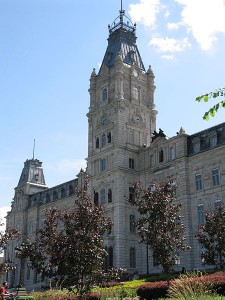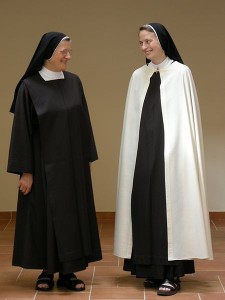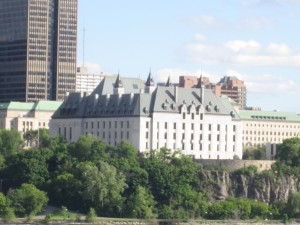The Government of Quebec appears to be of the view that the religious minorities in its employ are like the obnoxious smoker who contemptuously and purposely blows his smoke on the non-smoker. It gets under one’s nose. Religious people who wear specific clothing because of their religious faith are obnoxious – they are pushing their religion in a space where religion is not wanted.
This week will be an historic week for freedom of religion in the province of Quebec. Quebec Premier Pauline Marois’ government is expected to reveal some details of its “Charter of Quebec Values” tomorrow. The full Charter will not be released until the end of the legislature’s fall session. The press suggests that one of the expected provisions in this “charter” will be the requirement that all those who receive a salary from the government will not be permitted to wear religious symbols in the workplace.[1] Yet again Justice Rand’s 1953 statement in a religious freedom case from Quebec is applicable, “A religious incident reverberates from one end of this country to the other, and there is nothing to which the “body politic of the Dominion” is more sensitive.”[2]
Religious sensitivity will be in full display in the coming days and weeks in Quebec when Marois’ new charter is released. It is unthinkable that Canada, known as a welcoming society to people from all over the world, would have a provincial government taking direct aim at public religious expression of its citizens. Yet here we are. The fact that this new anti-religious rule is limited to government paid workers is of no comfort. First, since government paid workers will include school teachers and daycare workers it will send a message to all religious minority students that they need not apply to government careers; and second, this type of state discrimination will only increase. Today it is government paid workers who face this humiliation; who will be the target in the future as government becomes more emboldened after they are successful (which I doubt will be the case in the long term) in implementing this draconian measure?
What could possibly be the motivation for such an arcane policy? Pauline Marois suggested one possible reason. She said that “women working in daycares who wear hijabs are in a position to influence children to practice religion.”[3] Another government official is quoted as saying, “We don’t want children exposed to religious influences in the public sphere. That is a choice that belongs to parents.”[4] These are curious statements. Especially when you consider the irony that this is from the same government who introduced a mandatory course in the school curriculum that exposes children to the entire gambit of religious practices and beliefs – all without parental consent. Then, when some parents requested their children be exempted from the course the government refused[5] So much for a government concerned for parental rights over children’s religious upbringing! By the way, Quebec’s refusal to allow parents to exempt their children from the Ethics and Religious Culture curriculum has been to the Supreme Court of Canada once[6] and is subject of another case on its way to the same court, the “Loyola School Case.”[7]
The government of Quebec has now firmly entered the field of religion and its expression. It claims neutrality but its actions belie that claim. Rather, the government has taken the role of arbiter of what will be acceptable and unacceptable religious expression in society. Though, in its current form, the charter is limited to regulating the religious expression of government employees there can be little doubt that given time, considering the inflationary nature of state bureaucracy to expand its influence in citizen’s private lives, this policy of “neutrality” will move further toward the private sector employees. I can imagine that the justification will be along the lines that private sector employees must also be free from religious garb because, while they are not employed by the state, their work is nevertheless regulated by the state. They are in the “public” sphere – which must be “neutral.” So expect increased pressure on church run nursing homes or private schools. Private schools often give state-accredited diplomas. Therefore, as the logic would flow, they ought to be subject to government regulation in such matters as religious expression.[8]
If the Quebec government has its way the public sphere is about to become bland. All forms of religious dress in the “public service” will be unacceptable. No longer will the “public service” look like the public they ostensibly serve. They will instead have a “neutral” appearance. Of course, “neutrality” will be what the state says it is. Like beauty, it is in the eyes of the beholder. Perhaps the Quebec civil service would do well to wear a uniform – that way there can be little doubt as to what “neutral” clothing means? Then again, a state issued uniform also has difficulty when you consider that even the RCMP had to make accommodations for religious minorities wearing its distinctive uniform – the Sikh members of the force wear turbans.
While we may be tempted to rely on the Canadian Charter for the protection of minorities, recent Supreme Court of Canada decisions offer little comfort. Consider, for example, the decision involving a Hutterite community in the province of Alberta.[9] For 29 years the Alberta government exempted the Hutterites from having to have their picture taken for their drivers’ license. The Hutterites believe that all picture taking violates the Biblical Commandment that says we are not to make any graven image. For this reason they shun all portraits – including government issued identification. Alberta changed policy when it moved to a digital system for the drivers’ license – no longer would the Hutterites be exempt. The rationale given was that it was to protect against identity theft. This, despite the fact that there was not one case of identity theft of a Hutterite within the 29 years they were exempt from the photo requirement. Also consider that some 700,000 Albertans were without a drivers’ license, yet they were not required to have their picture taken to prevent identity theft. In perhaps the most shocking disregard for the right of religious freedom ever decided by the Supreme Court of Canada since the Charter in 1982, the Court held in favour of the Alberta government. The Court gave deference to the government because it was dealing with a “regulatory” matter and refused to accept the concept that government had to accommodate religion when it changed its policy. The Court reasoned that a regulatory policy of general application was different than the employer/employee relationship which allows an individual to be accommodated. A government could not be expected to make accommodations to specific individuals.“It cannot be expected to tailor a law to every possible future contingency, or every sincerely held religious belief. Laws of general application affect the general public, not just the claimants before the court.”[10]
There is little doubt that the Charter of Quebec Values will be challenged in court. t is inevitable – simply because it is so foolhardy. A possible argument against this Charter of Values will be the fact that, unlike the Hutterite case, it is a legislation that limits religious freedom directly as opposed to an indirect effect. There is nothing indirect by the Quebec government specifically targeting religious garb that many religious people wear everyday as part of their religious identity.
“A law’s constitutionality under s. 1 of the Charter is determined,” said the Supreme Court, “not by whether it is responsive to the unique needs of every individual claimant, but rather by whether its infringement of Charter rights is directed at an important objective and is proportionate in its overall impact.”[11] The government’s objective must be important and its’ impact on religious rights must be proportionate. In other words, an extremely important objective will be given more leeway to impact religious freedom – for example, as in the case of war. In a state of war, where the state’s very survival is at stake, religious freedom may be justifiably be curbed than it would otherwise be.
As noted above, the Quebec government objective has to be more than that they want to protect the parental rights to educate children on matters of religion. Giving the government the benefit of the doubt, perhaps they seek to bring about greater societal harmony by removing the religious symbols a person may wear. The government does not want to create employment strife by arguments over religion. There is no evidence to date of such a justification. However, it seems to me, even that argument will fail because such a policy will not bring harmony but division.
One would hope that the Supreme Court will distinguish the Quebec situation from the Alberta Hutterian case and strike down this Machiavellian effort to bully the religious minorities in its employ. In the Hutterian Case the Supreme Court added a further insult on the Hutterites; the Court said that they still maintained a “meaningful choice” to keep their religious practise because they did not need drivers’ licenses – they could simply hire transportation! Will the Court see that Quebec has upped the ante more than Alberta did to the Hutterites? In Quebec it is a matter of employment not drivers’ licenses. Will the court see these as similar or different?
If the Court understands the Quebec Government Charter to be similar to Alberta’s decision to change its drivers’ license policy then I suppose they could say the Quebec Government’s religious employees have a meaningful choice. The religious workers could work elsewhere and keep their religious practise. They do not need to work for the Quebec Government. I, for one, will argue vigorously for the right of Quebec’s religious minorities not to have to face such a disconcerting choice.
It is time for the Supreme Court to revisit, at the next opportunity, the concept of giving government deference in regulatory matters that have the effect of violating freedom of religion. A religious minority can never be on an equal playing field vis-à-vis the state. “Meaningful choice,” like “neutrality” will be decided by those who have no power or ability to decide for themselves. To say that a religious person can work elsewhere where they can wear their religious garb is not a satisfactory answer. What message is the government saying to society by implementing such a policy? Is it not saying that, “you are not valued as a citizen if you are so religious that you practise your faith by what you wear?” Where does it end? Is it unacceptable for a Mennonite Order woman to wear traditional plain dress if she were working for the Quebec government? Indeed such traditional plain dress is as much a religious statement as a Muslim woman to wear the hijab.
The Apostle Paul was taken to Gallio, proconsul of Achaia, because “This fellow persuades men to worship God contrary to the law.” Before Paul could answer to the charge Gallio responded, “If it were a matter of wrongdoing or wicked crimes, O Jews, there would be reason why I should bear with you. But if it is a question of words and names and your own law, look to it yourselves; for I do not want to be a judge of such matters.”[12]
Why the Province of Quebec would want to be “a judge of such matters” baffles me. Certainly the government has more to do than worry about the religious symbols on the clothing of its employees.







Great article! I was captivated to the end! Such wisdom! Thanks for sharing!